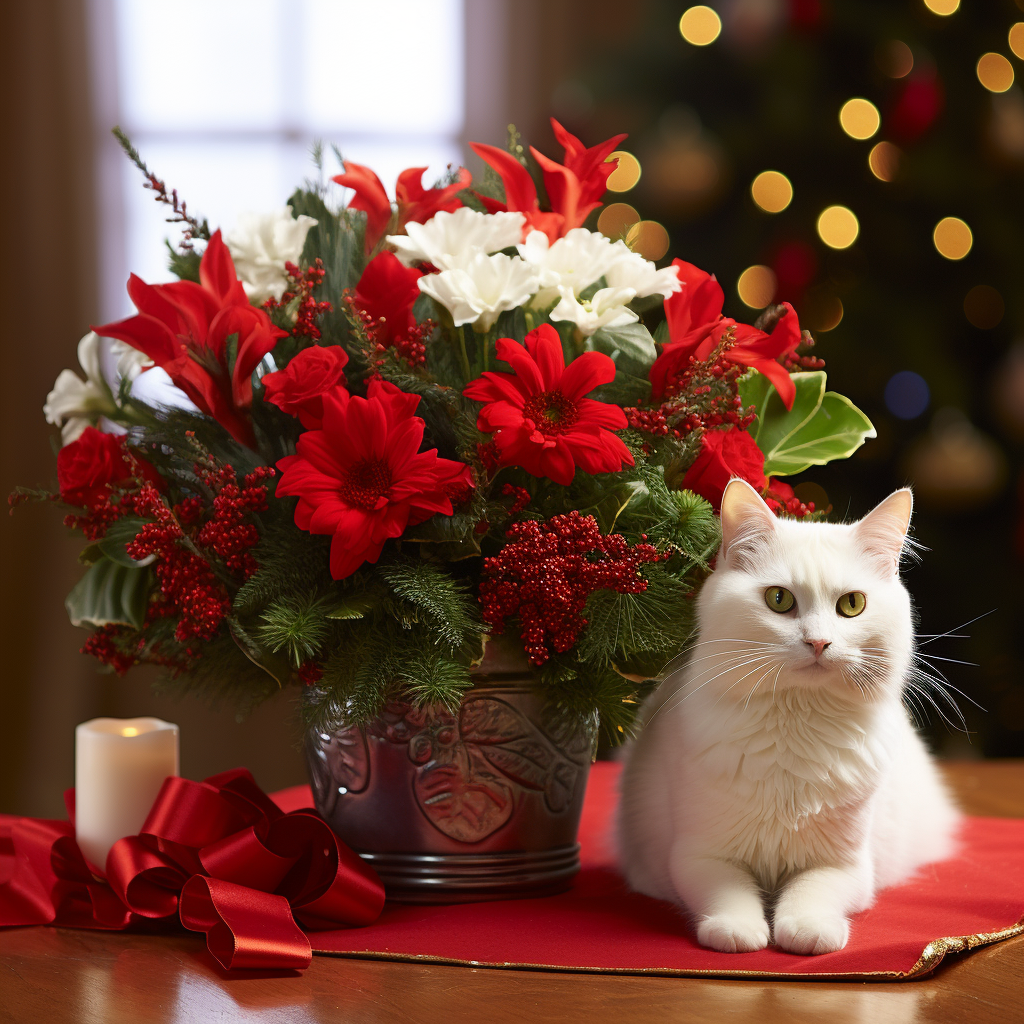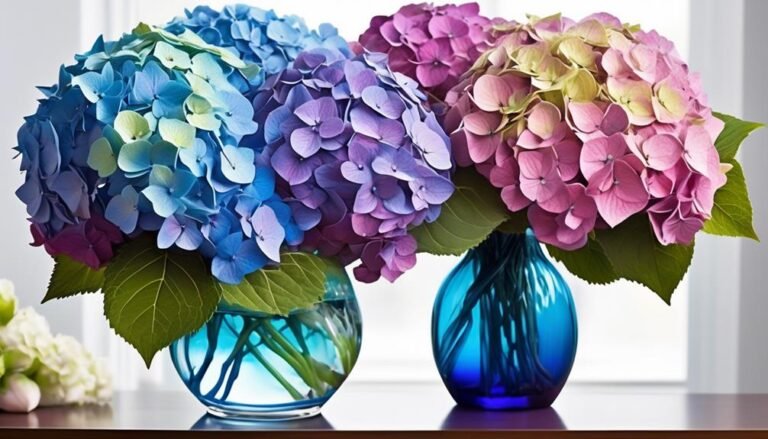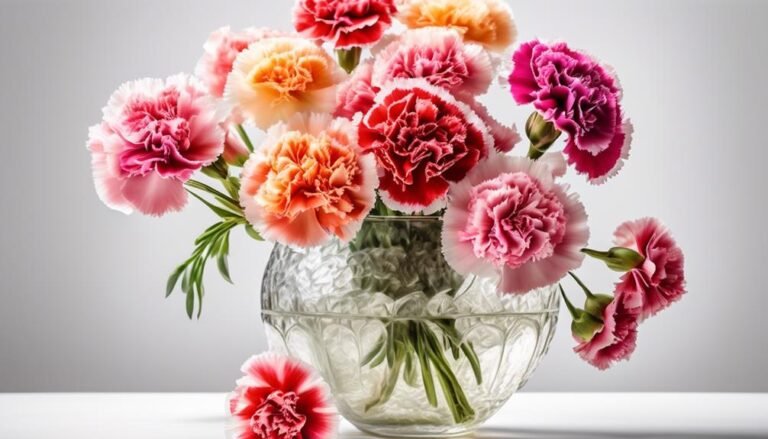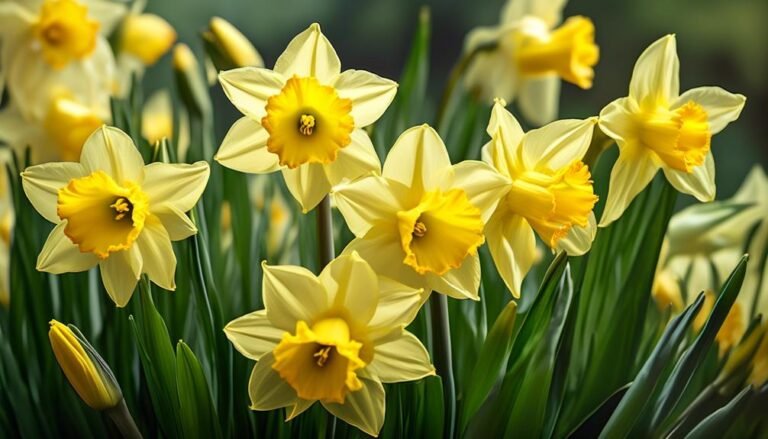Christmas Flowers That Are Poisonous for Cats: Learn which Christmas Plants Are Risky For Your Cat
What Christmas Flowers Are Poisonous for Cats?

Are you a cat owner eager to decorate your home with festive Christmas flowers? Knowing which blooms can harm your feline friend is crucial. In this article, we’ll explore “Christmas Flowers That Are Poisonous for Cats” and the risks they pose.
By understanding what plants to steer clear of, you can ensure your beloved pet’s safety during this joyous season. Watch out for ornamental pepper, peace lilies, amaryllis, holly, and American mistletoe, as they are all potentially toxic.
While poinsettias are often believed to be harmful, they are actually considered non-toxic. However, the sap may cause mild irritation and vomiting in cats and dogs.
Stay informed and keep your curious pets away from these potentially hazardous plants.
Table of Contents
Key Takeaways of Christmas Flowers That Are Poisonous for Cats:
- Amaryllis, mistletoe, lilies, and azaleas are highly toxic Christmas flowers for cats, and ingestion can lead to severe symptoms and even organ failure.
- Ornamental pepper and peace lily are moderately toxic Christmas flowers for cats, and ingestion can cause various symptoms including vomiting, diarrhoea, abdominal pain, and difficulty breathing.
- Poinsettias and holly are mildly toxic Christmas flowers for cats, and ingestion can result in irritation, upset stomach, and other discomfort.
- It is important to take safety precautions to keep toxic plants out of a cat’s reach, seek immediate veterinary care if ingestion is suspected, and consider using cat-friendly plants or alternatives during the holiday season.
Ornamental Pepper
Ornamental Pepper poses a potential danger to your feline companions during the Christmas season. This plant, with its vibrant red and green foliage, may seem like a festive addition to your holiday decor, but it’s important to be aware of its toxic nature for cats. Ornamental Pepper contains substances that are poisonous to cats if ingested.
Cats are curious creatures, and they may be tempted to nibble on the leaves or berries of the Ornamental Pepper plant. However, doing so can have detrimental effects on their health. The toxins present in the plant can cause a range of symptoms in cats, including vomiting, diarrhoea, abdominal pain, drooling, and even difficulty breathing. In severe cases, ingestion of Ornamental Pepper can lead to more serious complications, such as seizures or organ failure.
To ensure the safety of your feline friends, it’s crucial to keep Ornamental Pepper out of their reach. Place the plant in a location where your cats can’t access it, such as on a high shelf or in a room that’s off-limits to them. If you notice any signs of ingestion or poisoning, such as vomiting or lethargy, contact your veterinarian immediately for guidance and treatment.
During the Christmas season, it’s important to be mindful of the potential dangers that certain plants can pose to our beloved pets. While Ornamental Pepper may add a touch of holiday cheer to your home, it’s best to err on the side of caution and choose alternative, non-toxic plants that won’t harm your cats. By being aware of the toxic plants and taking necessary precautions, you can ensure a safe and joyful holiday season for both you and your feline companions.
Peace Lily
When decorating for Christmas, be cautious of including Peace Lily plants, as they can be poisonous to your cats if ingested. While these beautiful flowers may add a touch of elegance to your holiday decor, they pose a potential danger to your feline friends. It’s important to prioritize the safety and well-being of your pets by avoiding toxic plants like the Peace Lily.
The Peace Lily (Spathiphyllum) is a popular houseplant known for its lush green leaves and striking white flowers. However, despite its peaceful name, this plant contains calcium oxalate crystals, which can cause a range of symptoms in cats if consumed. These symptoms may include drooling, difficulty swallowing, vomiting, diarrhoea, and even oral irritation.
To help you better understand the potential risks associated with Peace Lily plants, here is a table outlining the toxicity levels of common Christmas flowers for cats:
| Christmas Flower | Toxicity Level |
|---|---|
| Ornamental Pepper | Mild to moderate |
| Peace Lily | Moderate to severe |
| Amaryllis | Severe |
| Holly | Severe |
| American Mistletoe | Severe |
As you can see, Peace Lily falls into the moderate to severe toxicity level category, meaning that ingestion can have serious consequences for your furry companions. If you suspect your cat has ingested any part of the Peace Lily plant, it is important to seek veterinary assistance immediately.
Amaryllis
If your cat ingests Amaryllis, a Christmas flower, it can have severe toxic effects. Amaryllis contains toxic substances that are potentially fatal to cats. The toxins in this flower can cause a range of symptoms, including vomiting, diarrhoea, abdominal pain, drooling, loss of appetite, and lethargy. In severe cases, it can even lead to organ failure and death.
One of the main concerns with Amaryllis is its effect on blood pressure. The toxic substances present in the plant can cause a significant drop in blood pressure, leading to weakness, disorientation, and even collapse. It’s essential to seek immediate veterinary care if you suspect your cat has ingested Amaryllis.
When it comes to treatment, there’s no specific antidote for Amaryllis poisoning. The veterinarian will focus on managing the symptoms and providing supportive care. This may include inducing vomiting, administering activated charcoal to absorb any remaining toxins in the stomach, and providing intravenous fluids to maintain hydration and support organ function.
Prevention is the best approach when it comes to Amaryllis and other toxic plants. Keep these flowers out of your cat’s reach, and if you receive them as a gift, display them in a location where your cat can’t access them. If you suspect your cat has ingested Amaryllis or any other poisonous plant, don’t wait for symptoms to appear. Contact your veterinarian immediately for guidance and assistance.
Holly
Keep Holly away from your cat during the holiday season to prevent potential poisoning. While holly is a popular decoration during Christmas, it can be toxic to cats if ingested. The berries of the holly plant are particularly dangerous and can cause serious harm to your feline friend. It is important to be aware of the potential risks and take necessary precautions to keep your cat safe.
If you suspect that your cat has ingested holly berries or any other toxic substance, it is important to contact your veterinarian or the animal poison control centre immediately. They will be able to provide you with the necessary guidance and advice on how to proceed. Remember, early intervention is key when it comes to preventing serious harm to your cat.
To help you further understand the potential dangers of holly berries, here is a table summarizing the risks:
| Holly Berries | Risks |
|---|---|
| Toxic to cats | Ingesting holly berries can be toxic to cats and cause serious harm. |
| Vomiting and diarrhoea | Cats may experience symptoms such as vomiting and diarrhoea after ingesting holly berries. |
| Abdominal discomfort | Ingestion of holly berries can cause abdominal pain and discomfort in cats. |
| Lethargy | Cats may become lethargic and show a lack of energy after consuming holly berries. |
| Loss of appetite | Ingesting holly berries can result in a loss of appetite in cats. |
| Dehydration | Cats may become dehydrated as a result of ingesting holly berries. |
Mistletoe
Avoid hanging mistletoe in areas accessible to your cat, as it can be toxic if ingested. Mistletoe contains a variety of toxins that can cause vomiting, diarrhoea, and even more severe symptoms if consumed by your feline friend.
When cats come into contact with mistletoe, they may be tempted to chew on the leaves or berries, unaware of the potential harm it can cause. The toxins present in mistletoe can irritate the gastrointestinal system, leading to symptoms such as drooling, abdominal pain, and nausea. In some cases, ingestion of mistletoe can even result in more severe complications, including difficulty breathing, seizures, or organ damage.
If you suspect that your cat has ingested mistletoe, it’s crucial to seek veterinary care immediately. Your veterinarian will be able to assess the situation and provide appropriate treatment to help minimize the potential harm caused by the toxic plant. They may induce vomiting to remove any remaining mistletoe from your cat’s system or administer medications to counteract the effects of the toxins.
To ensure the safety of your cat during the holiday season, it’s best to avoid bringing mistletoe into your home altogether. Opt for artificial alternatives or other non-toxic plants that can still add a festive touch to your decorations. By being proactive and mindful of the potential dangers of festive plants like mistletoe, you can help keep your furry friend safe and healthy throughout the holiday season.

Poinsettias
When handling poinsettias around your cat, be mindful of their potential to cause mild irritation and vomiting. While poinsettias are often considered non-toxic to cats, it’s important to remember that they can still pose a risk to your furry friend. The milky sap found in poinsettias contains chemicals called diterpenoid phorbol esters, which can cause irritation and upset stomachs if ingested by cats. Although the toxicity level is generally low, it’s best to take precautions to ensure your cat’s safety during the holiday season.
To help you understand the potential risks associated with poinsettias, here is a table highlighting their toxicity level for cats:
| Christmas Flowers | Toxicity Level for Cats |
|---|---|
| Poinsettias | Mild |
| Mistletoe | Highly Toxic |
| Holly | Mild |
| Amaryllis | Highly Toxic |
As you can see, poinsettias fall under the category of mild toxicity for cats. This means that while they may cause some discomfort, they are unlikely to cause severe harm or fatal consequences. However, it’s still important to keep your cat away from poinsettias to prevent any potential issues.
If you suspect that your cat has ingested parts of a poinsettia plant and is experiencing symptoms such as drooling, vomiting, or diarrhoea, it’s essential to contact your veterinarian immediately. They will be able to provide you with the appropriate guidance and advice based on your cat’s specific situation.
Lilies
If you have lilies in your home during the holiday season, it’s important to be aware that they can be highly toxic to cats. Lilies, which belong to the Lilium or Hemerocallis genus, are beautiful flowers commonly found in bouquets and floral arrangements. However, cat owners should exercise caution and keep these plants out of their homes to ensure the safety of their feline companions.
Lilies are particularly dangerous for cats because every part of the plant, including the petals, leaves, stems, and even the pollen, can be toxic. Even a small amount of any part of the lily can cause severe kidney damage and potentially be fatal to cats if ingested. It’s important to note that all types of lilies are toxic to cats, including Easter lilies, tiger lilies, and stargazer lilies.
One of the reasons lilies are so dangerous for cats is the presence of a white sap that can be found in the stems and leaves. If a cat comes into contact with this sap and then grooms itself, it can lead to poisoning. Ingesting any part of the lily can cause symptoms such as vomiting, diarrhoea, loss of appetite, lethargy, and even seizures. If you suspect that your cat has ingested any part of a lily, it’s crucial to seek immediate veterinary care.
To protect your cat from lily poisoning, it’s best to avoid having lilies in your home altogether. If you receive a bouquet that includes lilies, make sure to remove them and place them in a location where your cat can’t access them. Additionally, inform your friends and family about the dangers of lilies to cats, so they can avoid giving them as gifts. By being vigilant and taking preventive measures, you can ensure a safe and happy holiday season for both you and your feline companion.
Azaleas
Keep your cat safe during the holiday season by being aware of the dangers of azaleas. Azaleas are a popular yuletide plant that can pose a threat to your furry friend if ingested. These beautiful flowers contain toxins known as grayanotoxins, which can cause kidney failure in cats if consumed in large amounts.
If you suspect your cat has ingested azaleas, it’s important to watch out for any signs of poisoning. Symptoms can range from mild stomach upset, such as vomiting and diarrhoea, to more severe effects like decreased appetite and even death. It’s crucial to seek immediate veterinary attention if you notice any abnormal behaviour or symptoms in your cat.
During the holiday season, it’s common to have azaleas as part of floral arrangements or as decorations in your home. To keep your cat safe, make sure these plants are placed in areas that are out of reach and inaccessible to your pet. Consider using alternative cat-friendly plants, such as Christmas cactus, which are non-toxic and won’t pose a danger to your furry friend.
While azaleas are highly toxic to cats, it’s important to note that other holiday plants can also be harmful. Keep poinsettias, holly, and mistletoe out of your cat’s reach, as they can cause mild stomach upset if ingested. Additionally, be cautious with Christmas trees and decorations, as tinsel and ornaments may be tempting for cats to play with and can lead to choking hazards or intestinal blockages.
Frequently Asked Questions:
Q: Are poinsettias poisonous to cats?
A: Yes, poinsettias are considered to be mildly toxic to cats. While ingestion may cause drooling, vomiting, or mild stomach upset, severe reactions are rare.
Q: What are some popular holiday plants that are dangerous to cats?
A: Some popular holiday plants that are toxic to cats include mistletoe, holly, and lilies. These plants can cause various degrees of toxicity if ingested by cats.
Q: How can I keep my cat safe from toxic holiday plants?
A: To keep your cat safe from toxic holiday plants, it’s important to choose cat-friendly decorations and opt for non-toxic plants like Christmas cacti, spider plants, or African violet. You should also keep potentially harmful plants out of your cat’s reach.
Q: Are there any seasonal plants that are safe for cats?
A: Yes, several seasonal plants are safe for cats, including Christmas cactus, zinnias, and roses. These plants are non-toxic and won’t pose a threat to your cat if ingested.
Q: Can English holly be harmful to cats?
A: Yes, English holly is toxic to cats. Ingesting its spiny leaves and berries can cause vomiting, diarrhoea, and lethargy in cats. It’s important to keep English holly out of reach of your feline friend.
Q: How can I avoid plants that are poisonous to cats during the holiday season?
A: To avoid plants that are poisonous to cats during the holiday season, carefully research and opt for non-toxic alternatives. You can also consider artificial plants or decorations that don’t pose a risk to your cat.
Q: What are some signs that a plant is toxic to cats?
A: Signs that a plant may be toxic to cats include vomiting, diarrhoea, excessive drooling, difficulty breathing, and changes in behaviour. If you suspect that your cat has ingested a toxic plant, seek veterinary care immediately.
Q: Can the white sap found in poinsettias be harmful to cats?
A: Yes, the white sap found in poinsettias can be irritating to a cat’s mouth and stomach if ingested. While it’s not highly toxic, it’s still best to keep poinsettias and their sap away from your curious feline friend.
Q: What should I do if I think my cat has ingested a poisonous plant?
A: If you suspect that your cat has ingested a poisonous plant, contact your veterinarian or an animal poison control centre immediately. Provide as much information as possible about the plant and your cat’s symptoms.
Q: How can I ensure that my holiday decorations are safe for my cat?
A: To ensure that your holiday decorations are safe for your cat, choose non-toxic plants and secure decorations to prevent your cat from knocking them over. Keep your Christmas tree stable and use a tree stand cover to deter your cat from drinking tree water, which may contain harmful preservatives.
Final Thoughts
In our closing summary, cat owners need to be aware of the potential dangers that certain Christmas flowers can pose to their feline friends. Plants such as ornamental pepper, peace lilies, amaryllis, holly, mistletoe, and lilies can be toxic and cause harm to cats if ingested.
While poinsettias aren’t considered toxic, they can still cause mild irritation and vomiting.
By avoiding these plants and keeping a watchful eye on your pets, you can ensure a safe and joyful holiday season for everyone.





